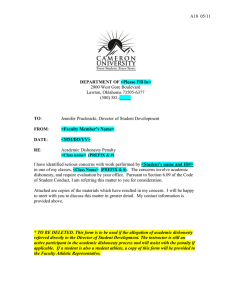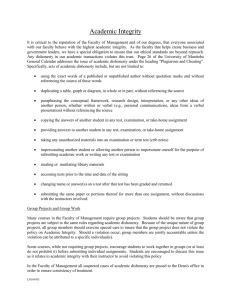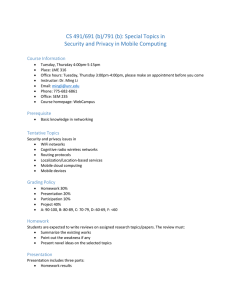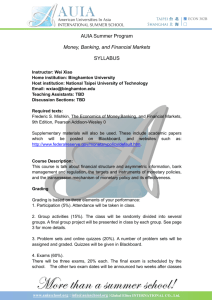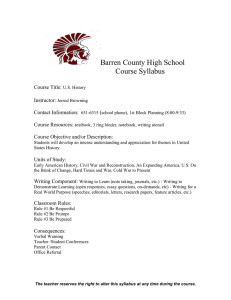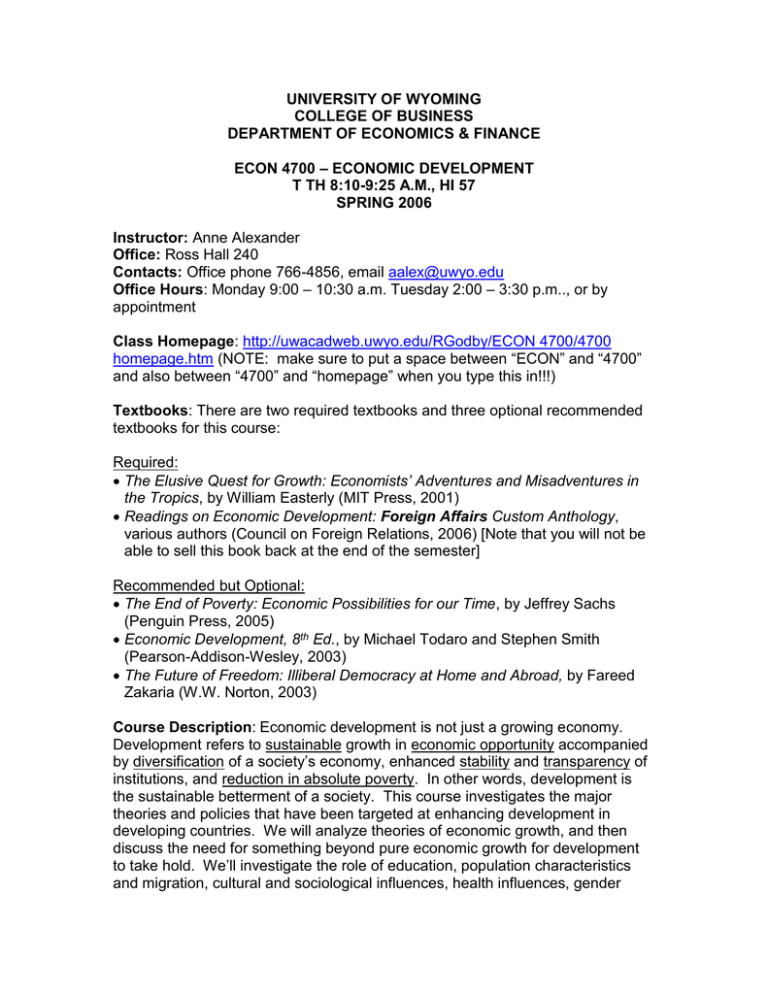
UNIVERSITY OF WYOMING
COLLEGE OF BUSINESS
DEPARTMENT OF ECONOMICS & FINANCE
ECON 4700 – ECONOMIC DEVELOPMENT
T TH 8:10-9:25 A.M., HI 57
SPRING 2006
Instructor: Anne Alexander
Office: Ross Hall 240
Contacts: Office phone 766-4856, email aalex@uwyo.edu
Office Hours: Monday 9:00 – 10:30 a.m. Tuesday 2:00 – 3:30 p.m.., or by
appointment
Class Homepage: http://uwacadweb.uwyo.edu/RGodby/ECON 4700/4700
homepage.htm (NOTE: make sure to put a space between “ECON” and “4700”
and also between “4700” and “homepage” when you type this in!!!)
Textbooks: There are two required textbooks and three optional recommended
textbooks for this course:
Required:
The Elusive Quest for Growth: Economists’ Adventures and Misadventures in
the Tropics, by William Easterly (MIT Press, 2001)
Readings on Economic Development: Foreign Affairs Custom Anthology,
various authors (Council on Foreign Relations, 2006) [Note that you will not be
able to sell this book back at the end of the semester]
Recommended but Optional:
The End of Poverty: Economic Possibilities for our Time, by Jeffrey Sachs
(Penguin Press, 2005)
Economic Development, 8th Ed., by Michael Todaro and Stephen Smith
(Pearson-Addison-Wesley, 2003)
The Future of Freedom: Illiberal Democracy at Home and Abroad, by Fareed
Zakaria (W.W. Norton, 2003)
Course Description: Economic development is not just a growing economy.
Development refers to sustainable growth in economic opportunity accompanied
by diversification of a society’s economy, enhanced stability and transparency of
institutions, and reduction in absolute poverty. In other words, development is
the sustainable betterment of a society. This course investigates the major
theories and policies that have been targeted at enhancing development in
developing countries. We will analyze theories of economic growth, and then
discuss the need for something beyond pure economic growth for development
to take hold. We’ll investigate the role of education, population characteristics
and migration, cultural and sociological influences, health influences, gender
equality, host government policies, foreign trade and investment, and foreign aid
and debt in economic development. We will discuss the importance of human,
physical, and natural capital, economic diversification, and governance in
sustainable development that improves health, life expectancy, literacy, and
other measures of welfare in a population.
Course Objectives: By the end of this course, students should be able to:
Explain, discuss, and analyze the basic measures of economic welfare and
opportunity.
Discuss and analyze the various theories of economic growth, including
Kuznet’s Six Characteristics, Rostow’s Stages of Growth, Harrod-Domar,
and the Romer models.
Discuss and analyze the various theories of economic development,
including the Lewis, structural change, the International Dependence, and
coordination/multiple equilibria theories.
Analyze the role of human, physical, and natural capital; investment, trade,
and aid; and institutions and governance in development.
Explain the fundamental importance of agriculture and industrialization in
development.
Explain and analyze the fundamental importance of social and cultural
structures in development.
Prerequisites: PRIOR TO THIS CLASS, you MUST have already taken both:
ECON 1010, Principles of Macroeconomics, and ECON 1020. Principles of
Microeconomics. If you have not completed one or both of these courses,
you will be administratively dropped from ECON 4700 unless you have
made other arrangements.
Grading Policy and Requirements: You will earn your grade in this course by
successfully completing the following:
Guided log entries – over the semester, you will be asked to keep a “log”
or journal in which you will answer specific questions, analyze problems
posed to you, and brainstorm ideas for papers and class discussion. Each
week, I will post or direct you to a series of questions or problems. You
will answer them in your log, which can be either hand-written or
electronic. I will grade these at random points in the semester, but will
give you notice so that you may bring them to class. Quality responses to
every posted question/problem will warrant the highest grades. We will
discuss in detail the structure and grading of the logs separately.
Case studies – You will be asked to analyze several (3-5) country- or
issue-specific cases or scenarios in class or in between class meetings. I
will ask questions and/or thesis support exercises to analyze the case the
case that you will be expected to answer professionally and completely.
In some cases you may be allowed to work collaboratively, but you
should work together only when expressly asked to do so.
Examinations – there will be three in-class examinations over the course
of this semester. .
Briefing Paper, including Annotated Bibliography, Draft, and Final Briefing
paper. – you will be writing a briefing paper over the course of the
semester. An annotated bibliography will be due roughly mid-semester. A
draft will be due in late March. The final version will be due in late April.
Details about the paper and its components will be discussed separately.
You will earn your final grade according to the following:
Guided Log Entries: 15% of final grade
Case Studies: 10% of final grade
Examination #1: 20% of final grade
Examination #2: 20% of final grade
Examination #3: 20% of final grade
Briefing Paper: 15% of final grade (bibliography = 4%; draft version = 5%; final
version = 6% of final grade)
Letter grades are determined by: 90-100% = A, 80-89.99% = B, 70-79.99% = C,
60-69.99% = D, below 60% = F.
Final Examination Time and Policy: According to the Spring 2006 Class
Schedule, the final examination in this class is scheduled to be held Thursday,
May 4 from 8 a.m. until 10 a.m. Make note of this time-block on your
calendar now, and make your travel and other plans accordingly. This date
and time is NOT negotiable – I am unable to accommodate any requests for
alternate exam schedules. There are only two exceptions to this: if you (1) have
another exam scheduled at that time and on that date, or (2) have more than two
exams on that day, you may request an alternate exam time from me. Otherwise,
all finals will be given at the time listed above.
Class Homepage: The class homepage contains links to the syllabus, the
course schedule, and announcements. There is also a link to the Todaro and
Smith book’s website which you may find helpful as a reference. It also has a
link for reading and log assignments that is updated as we move along so you
can plan for what you need to do. You should check the page DAILY – it may not
change every single day, but it will change often! Any changes to course
coverage, assignments, and other special announcements will be made here,
and it is your responsibility to track them.
Attendance Policy: Attendance is not required; however, you should attend
class on a regular basis. Missing class will mean you miss assignments and
problems for credit as well as material, discussion, and announcements that may
be important. If you miss a class meeting, YOU are expected to obtain notes and
other material on your own. You cannot make up material done in class unless
you have an authorized University excuse.
Classroom Deportment and Decorum: According to the Student Code of
Conduct and University Regulations, students have responsibilities as well as
rights in the classroom. Your obligation is to deport yourself in this classroom so
as to uphold a nurturing academic atmosphere. This includes:
(1)
Treat each other, and me, with respect. Conduct yourself in a civil
manner at all times in this classroom. We don’t have to be boring and
lifeless in class, but please remember to be respectful of others.
(2)
Turn off all personal electronic devices, computers excluded, in the
classroom unless you have expressed permission from me for them to
be on. This includes cells, PDA’s, and music devices.
(3)
Do not talk amongst yourselves unless it is called for in class. If you
display disruptive classroom behavior, I have the right to have you
removed from my class.
(4)
Do not use wireless mice or other wireless utility devices in this
classroom unless you have expressed permission from me.
Academic Dishonesty: Academic dishonesty will not be tolerated in this course,
and violators will be found and disciplined to the fullest extent of University
Regulations. Academic dishonesty includes
representing the work, thoughts, and ideas of another person as your
own;
allowing another student to copy your work;
being complicit in academic dishonesty by suspecting or knowing of it
and not taking action;
giving or receiving assistance without authorization on any assignment
or exam; or
using unauthorized electronic devices or other material when
prohibited from doing so.
Academic dishonesty in the context of a written paper, including buying or
stealing other people’s work and representing it as your own, will be easily
detected. The College of Business uses a software program that is designed to
detect such behavior. I also employ a technology called “my brain” which very
easily picks up writing which is not yours. If you are academically dishonest on
any stage of your paper, you will receive an “F” on the full 15% of your paper
grade.
Academic dishonesty on any examination, including giving OR receiving ANY
unauthorized assistance on the exam, will result in an “F” for the full 20% of that
examination grade.
Academic dishonesty in a group setting (e.g. authorized collaborative
assignments) will be handled on a case-by-case basis. If a preponderance of
evidence shows that the group as a whole was complicit in an act of academic
dishonesty, all members will be penalized identically for that act. If the evidence
shows that one member is largely responsible for the academic dishonesty, that
member will be penalized for the act. All group members are responsible for
carefully monitoring their group’s work so that sources are cited properly and all
work that is not quoted or cited is indeed the group’s own work.
Any case of academic dishonesty will be prosecuted in accordance with UNIREG
802 Rev. 2. Academic dishonesty can result in a permanent "F" in this course, a
permanent notice of academic dishonesty in your student citizenship file, or
suspension from the University. For more information on academic dishonesty,
see University regulations.
Course Schedule: The course schedule for the semester will be posted on the
class homepage. It contains tentative due dates and exam dates as well as topic
coverage. This schedule may be deviated from over the session, but will provide
you with ample notice on what chapters you should be reading. You should
download it as soon as possible. Revised schedules may appear over the course
of the semester.
Disclaimer: All of the above information is subject to change when deemed
necessary by the instructor. Students will be notified verbally in class or via
postings on the class homepage if such changes occur.

